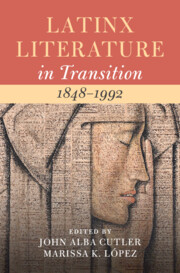Book contents
- Latinx Literature in Transition, 1848–1992
- Latinx literature in transition
- Latinx Literature in Transition, 1848–1992
- Copyright page
- Dedication
- Contents
- Figures
- Contributors
- Acknowledgments
- Introduction
- Part I Space
- Part II Being
- Part III Time
- Part IV Form
- Chapter 13 Entre Balas y Rugidos
- Chapter 14 Modernism’s Workshops
- Chapter 15 Lyrical Mobilities
- Chapter 16 Bullets, Guns, and Tattoos
- Part V Labor
- Bibliography
- Index
- References
Chapter 13 - Entre Balas y Rugidos
Translating the Leonor Villegas de Magnón Archive into a Digital Exhibit
from Part IV - Form
Published online by Cambridge University Press: 10 April 2025
- Latinx Literature in Transition, 1848–1992
- Latinx literature in transition
- Latinx Literature in Transition, 1848–1992
- Copyright page
- Dedication
- Contents
- Figures
- Contributors
- Acknowledgments
- Introduction
- Part I Space
- Part II Being
- Part III Time
- Part IV Form
- Chapter 13 Entre Balas y Rugidos
- Chapter 14 Modernism’s Workshops
- Chapter 15 Lyrical Mobilities
- Chapter 16 Bullets, Guns, and Tattoos
- Part V Labor
- Bibliography
- Index
- References
Summary
Writing in the US in the early twentieth century, Leonor Villegas de Magnón was a Mexican American activist, educator, nurse, and founder of La Cruz Blanca Constitucionalista, a group of nurses established during the Mexican Revolution. Her most comprehensive text is her autobiography, which chronicles the contributions of La Cruz Blanca and which she essentially writes twice, once in Spanish for the Mexican and Mexican American reader, and then in English for the English-speaking readers of the US. What becomes apparent as she shifts audiences, in her writing and in her archive, is a preoccupation not only with the preservation of history and culture, but with its translation. This chapter proposes that this question of translation (across languages, generations, nations, and cultures) is one equally applicable to the task of digitizing archival material. In making the physical archive digitally accessible, digital humanists are enacting translation and must wrestle with questions regarding the responsibilities of the translator. Guided by the question of the ethics of translation, this chapter outlines the process of creating an online exhibit of Villegas de Magnon’s archive, finally claiming that the project of Latinx Digital Humanities is itself an urgent but complex task of translation.
Keywords
- Type
- Chapter
- Information
- Latinx Literature in Transition, 1848–1992 , pp. 227 - 241Publisher: Cambridge University PressPrint publication year: 2025

